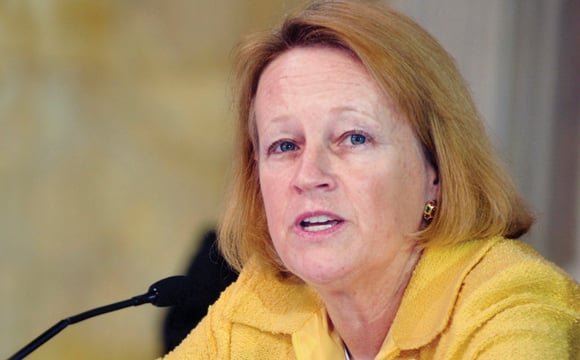The Securities and Exchange Commission staff is prepared to present money market fund proposals as soon as Chairman Mary Schapiro indicates that she wants to proceed on the controversial issue, according to a top SEC official.
"When the director schedules a [commission] meeting, we'll be ready," Robert Plaze, deputy director of the SEC Division of Investment Management told reporters Tuesday after addressing the Mutual Fund Directors Forum in Washington. “We understand the issues and are waiting for direction from the chair.”
Since last November, Ms. Schapiro has been stressing that money market funds continue to be vulnerable to runs such as the one in 2008 that forced the Reserve Primary Fund to "break the buck" — the $1 net asset value return that shareholders are promised.
Investor stampedes out of the funds, such as the one that followed the Reserve Primary Fund breakdown, pose a systemic risk to financial markets, according to Ms. Schapiro.
But fierce resistance from industry and members of both parties of Congress may be slowing down money market reforms. Observers speculate that the two Republicans on the five-member SEC would oppose a proposal and that commissioner Luis Aguilar also has qualms.
Ms. Schapiro will have a chance to shed more light on the issue Thursday when she addresses a Senate Banking Committee hearing.
This is shaping up as a money market funds week in Washington. In addition to the Senate hearing and the mutual fund conference, the U.S. Chamber of Commerce released a
report statement Monday, warning that reforms that the SEC is considering would sharply increase borrowing costs for businesses and governments and add tens of billions of dollars in annual expenses for consumers and taxpayers.
The changes that the SEC is considering are to allow a floating NAV or to combine an NAV buffer with redemption restrictions.
Opponents say that the 2010 reforms that the SEC implemented in response to the Reserve Fund debacle — increasing liquidity requirements and decreasing their interest rate exposure – are sufficient to strengthen the sector.
In his appearance at the mutual fund conference, Mr. Plaze said that the 2010 reforms addressed some money fund weaknesses but didn't reduce other threats.
"A single credit event can force a money market fund to break a dollar," Mr. Plaze said. "Money market funds have no ability to withstand significant losses."
If investors pull their money out of the funds in droves, it can make the vehicles "transmitters and amplifiers" of crises, according to Mr. Plaze.
For instance, "money market mutual funds may be the transmission by which events in Europe affect our markets."
There also is an inherent problem in redemption practices, Mr. Plaze said.
Institutional investors are always at an advantage and "can exercise a put to the fund" by withdrawing their money while the NAV is at $1, leaving smaller investors to absorb losses if the fund breaks the buck, he said.
"The question is: Is that fair?" Mr. Plaze said. "Is that consistent with the values of the Investment Company Act in terms of treating all investors fairly?"
The moderator for Mr. Plaze's presentation expressed the industry's misgivings about reform.
Regulators must be careful not to drive investors away from money funds, said Susan Ferris Wyderko, president and chief executive of the Mutual Fund Directors Forum.
"If a substantial amount of assets move out of the money fund universe, regulators need to be concerned about where they go," she said.
Ms. Wyderko warned that the money could wind up in offshore or other unregulated funds or in bank accounts, which are all less transparent than mutual funds.
"There may be an enhanced systemic risk from the movement of these assets into other cash management vehicles," she said.
Ms. Wyderko tapped Mr. Plaze as a replacement for the scheduled speaker, Eileen Rominger, director of the SEC Division of Investment Management. The SEC said Friday that Ms. Rominger, a 30-year veteran of Wall Street asset management firms, will depart next month after working for a year-and-a-half at the SEC.
"She has personal reasons, and I take her word on that," Mr. Plaze said.
"There's nothing internal at the commission. There's nothing juicy there," Mr. Plaze said.
"I know I will miss her," he said.







